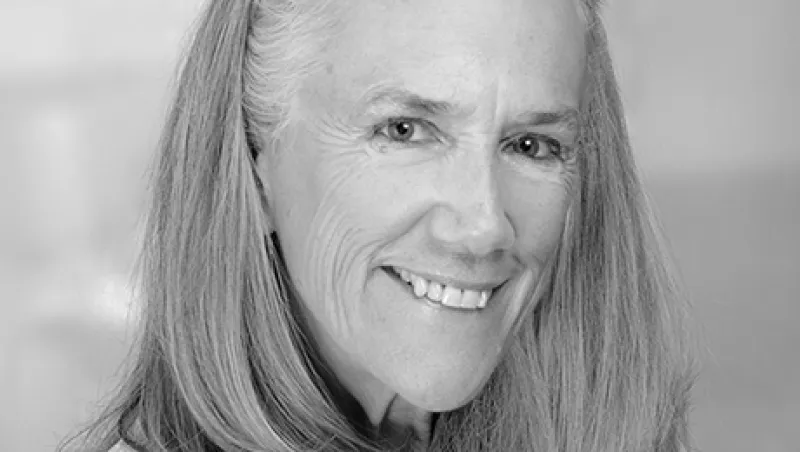Charlotte Beyer’s new book, Wealth Management Unwrapped, gives affluent families plenty of tips on managing their finances while focusing on the quality of their lives. Using vivid examples and infographics, the plainspoken Beyer lays out the pitfalls to avoid when choosing advisers and making other decisions that will impact future generations. A financial industry veteran who in 1991 founded the New York–based Institute for Private Investors (IPI), whose members include some 1,200 ultra-high-net-worth individuals in 18 countries, she also knows what investors look for in a wealth management professional.
Beyer spent two decades with Wall Street firms including Bankers Trust Co. and Lazard before launching IPI. In 2004 she founded the Investor Education Collaborative, an online venture inspired by her work in helping establish the Private Wealth Management Program at the Wharton School of the University of Pennsylvania and developing similar programs at other colleges. Beyer recently shared her views with Contributor Andrew Barber on how advisers can build strong client relationships.
Institutional Investor: In Chapter 1 you focus on a question that investors need to ask themselves as they select an adviser: Who is brave enough to tell a customer, “You’re wrong”? Wealth management is a service industry, so making such a statement requires tact. How do you recommend that advisers approach this?
Beyer: You are right; most advisers will defer. And yet as one investor put it, “Many advisers are reluctant to tell the truth as they see it to their clients. Advisers are afraid of upsetting their clients and so don’t ask hard questions or urge clients to do something that their clients are not inclined to do. Although this lack of candor may be an understandable human characteristic, it is not especially helpful to us.”
A more candid and open dialogue about the inevitable disagreements the adviser and the client will encounter — before they actually occur — will help avoid any unpleasantness down the line.
Your second chapter contains an invaluable discussion of what turns people off about their advisers and of how people feel about the role that wealth plays in their lives. How can advisers help their clients put money in perspective so they can make the correct decisions for them and focus on living life?
Wealth is uniquely personal, and what you want from your wealth changes over the course of your life. The question about the purpose of wealth is answered in different ways; sometimes years of seeing security as paramount may disappear when the investor finally recognizes there is enough to leave a meaningful legacy. The successful adviser makes no assumptions about correct decisions because he or she could risk alienating the client. One investor may love poring over investment data and portfolio analytics, while another wants to talk about anything but investments. Thus a focus on living life can take surprising twists and turns.
I recall one situation where the client was disturbed because the adviser kept trying to persuade him to be more systematic in his philanthropy. What this individual, rightly or wrongly, enjoyed most was giving money to his friends’ charities. The quid pro quo over decades worked for him.
You mention jargon in a negative context frequently throughout the book. Would you advise a wealth manager to dispense with jargon entirely and be more direct?
Jargon can be something to hide behind, often representing an imbalance of power, and that can never work well if you are trying to build a lasting partnership. Language should not separate but rather foster a mutual understanding. Any real communication requires the receiver to grasp what is being said; otherwise the communication has delivered nothing of value.
Should advisers be more direct? Maybe, but maybe not. Direct can often fall into condescension or pedantic repetition. Perhaps a more precise approach would be clearly explaining, or teaching, finance and investing at the level understood by the investor.
You note the growing practice of adding personal certifications to titles, pointing out the difference between a CFA and a designation with a much lower bar. How should an adviser represent education and other credentials?
If an adviser explains clearly what he or she does for a client, specifically outlining the investment policy statement, outcomes and how together they will determine risk targets, the adviser can weave in the credentials that aid in that process. Expertise is best proved not by letters of the alphabet behind your name but rather by illustrations of how the expertise is actually used to benefit a client.
The Monte Carlo exercise is a powerful way to walk though possibilities with a client, describing the impact of market gyrations and testing out how much risk is comfortable. Show, rather than tell, your expertise with engaging exercises and interesting questions.
You advise investors to ask for references. Should advisers be proactive on that front?
Advisers who hand prospects a list of questions to ask any adviser they are interviewing will have a competitive advantage. “Will you supply references?” is an obvious question to include on that list. Prospects appreciate an adviser’s guidance, and when an adviser goes so far as to suggest interviewing other firms, this underscores the adviser’s confidence in his or her own expertise.
When a client decides to fire their wealth manager, how do you suggest the adviser handle the situation?
The story I tell in my book begins right after the financial crisis. One investor was furious with his adviser because he lost a lot of money. Here’s how the investor described what happened next: “What had most annoyed me was not seeing a context for evaluating my performance. By asking the question and stating my complaint, I found my adviser was able to refine the reports, giving me a frame of reference to evaluate my returns objectively. I could compare my returns and risk against other portfolios, and in that context, I saw my returns were pretty impressive. Now I feel confident and comfortable that my adviser is doing a great job for me.”
Now, you might ask, why didn’t the adviser do that without almost being fired? In my view, advisers often learn from their most demanding clients. The enhancements needed are usually being voiced by at least one client, if only the firm is listening.
When an adviser feels that a client is not a good fit for his or her services during an initial meeting, how should they handle it?
Diplomatically. You might explain how your firm wants to exceed a client’s expectations in servicing and performance, and that from this meeting, you sense that your firm might disappoint them.
Get more on registered investment advisers.






